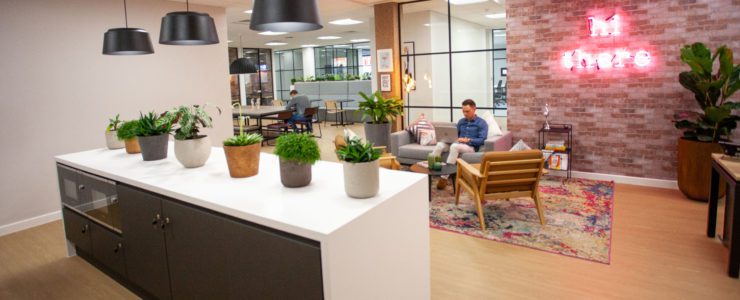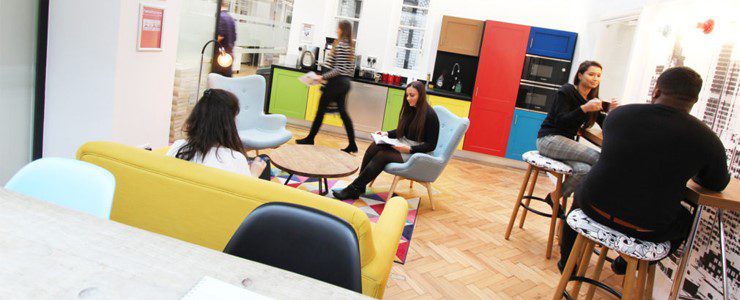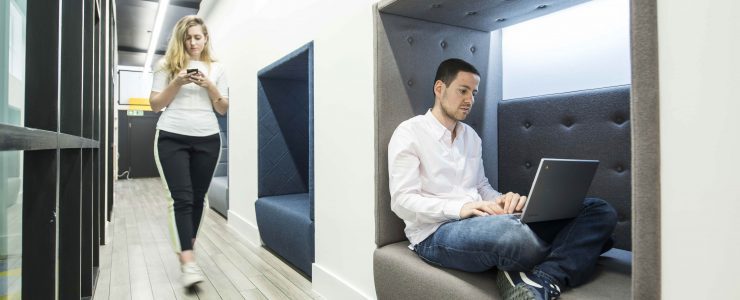
How to cut your overheads: Coworking environments
As businesses look at ways of saving money, coworking environments have been mooted as a way of cutting overheads with research suggesting they could save the average business more than £4,000 a year in running costs.
There can be no doubt that pandemic has had a devastating impact on the global economy, and while the UK’s GDP clawed back some ground in the third quarter, it is by no means stable. So how can businesses cut expenditure?
One way of weathering the storm will be our ability to cut business overheads. The major difference between this recession and previous ones is the way our working practices have changed. With employees encouraged to work from home, there has been greater online activity and more flexible working arrangements.
Different ways of working such as video-conferencing and virtual meetings with managers, colleagues, clients and business contacts, have reduced the need for everyone to be working together, 9-5, in a traditional office environment. The lockdown has made more people realise there are viable alternatives.
Working flexibly means businesses have a chance to cut their overheads when it comes to the costs associated with traditional office space. According to the UK Market Summary 2019, it can cost up to £4,000 extra per year to work from an office with a fixed lease, compared with flexible workspaces.
How can coworking help?
When money is tight and no-one can be certain how the situation will pan out in 2021, doesn’t it pay to have a plan in place?
Coworking can take the place of traditional office rentals and the associated overheads such as the contracted building rental costs, business rates, electricity bills, water rates, insurance, the terms of the lease and other expenditure. Not only does it provide working flexibility, it also creates a productive office space, while presenting a better alternative to working from home, where loneliness and a lack of social stimulation and practical workspace can bring their own set of challenges.
Reducing these barriers to productivity has led some companies to hire desks in coworking spaces during the pandemic. This is not only saving money on regular office rental costs and the associated overheads, it also provides employees with the environment and stimulus they need to work productively.
Coworking has become the norm for more employees, providing the facilities and human interaction that homeworking lacks. Coworking spaces combine modern technology such as superfast WiFi with a Covid-safe workspace, where we can socialise and collaborate with like-minded people, while observing social distancing.
The UK’s coworking environments are continuing to follow the relevant safety procedures associated with the pandemic. Workers can enjoy the benefits of the amenities, without putting themselves at risk, as the working conditions are updated depending on the continually-changing government health advice.
Is coworking the way forward post-pandemic?
Coworking provides a more productive environment that employees can benefit from in the long-term, rather than struggling with homeworking. It enables company-owners to cut their overheads, not only during the current pandemic, but also beyond, as coworking is quickly becoming the preferred choice for many businesses.
Signing a long-term office lease has been the norm for years and is commonly thought of as necessary expenditure. However, office rent is the second largest expense for UK companies after staffing, so any opportunity to downsize and reduce day-to-day costs should be embraced.
The average monthly cost of coworking space per person in the UK varies between £150 and £1,500, depending on the office’s location and its amenities. You also don’t have to worry about other overheads, such as equipment maintenance costs and bills, as everything is covered in your monthly payment.
More businesses have seen the light in terms of the benefits of coworking recently, as research shows the demand for workspaces with 25 or more desks has increased by around 35% across the UK. It appears more business owners are looking at new ways of avoiding the expense of the traditional office.
The beauty of coworking is being able to rent desks or offices for just as long as you need. They have all the latest tech and the right environment for businesses to run successfully during the pandemic and beyond.
What kind of industries can coworking help?
New research, published in September 2020, revealed more than three-quarters of UK managers believed collaborative workspaces were currently more suitable for their business model, compared with a full-time staffed office.
The study by UK business telecommunications provider Onecom surveyed 1,000 managers in all sectors. It found 77% of respondents agreed more casual workspaces to facilitate collaborative working and meetings (such as a coworking space) had “significant advantages” over a traditional office. More than half (56%) said the pandemic had “changed forever” their working practices. They didn’t expect the workplace to go back to what it was before, even after Covid-19 had subsided.
Research carried out by Deskmag during 2020 revealed the average coworking hub is mainly used by freelancers, who account for 41% of the total workforce. However, corporate workers are now a close second, using 36% of the UK office space. This suggests larger companies are now making good use of coworking spaces as well.
The IT industry has the biggest number of coworkers, filling 22% of spaces. This is followed by PR and marketing at 14%. Other industries using coworking spaces include consultants, finance companies, the property sector, sales reps who are on the road a lot and a wide variety of cross-sector SMEs and start-ups.
Europe’s largest network of tech and digital professionals, Talent Garden, is one company that has embraced coworking, as its employees are now spread across 28 different flexible locations. Founder and CEO, Davide Dattoli, believes coworking will continue to expand, even after the pandemic. He says people will always value the sense of community it provides in a physical space, providing face-to-face human interactions that can never be replicated online.



